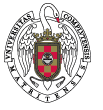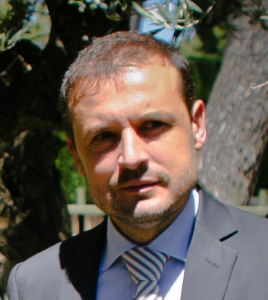| Home | Strategy | Activities | Grants | Publications | People | Sponsors | Contact Us | ||||||||||||||||
Ignacio Martín Llorente
News
Ignacio M. Llorente has received the ARITMEL 2020 Computer Science Award - Spanish Scientific Society for Informatics - for his exceptional scientific contributions to cloud computing.
Position
Full Professor (Catedrático) and Head of Research Group
Distributed Systems Architecture Research Group
Facultad de Informática
Universidad Complutense de Madrid
C/Prof. Jose Garcia Santesmases s/n
28040 Madrid, Spain
voice: +34-91-3947616, fax: +34-91-3947527
e-mail: imllorente [at] ucm [dot] es
Visiting Professor
Institute for Applied Computational Science
Harvard School of Engineering and Applied Sciences
Harvard University
33 Oxford Street
Cambridge, MA 02138, USA
voice: +1 (617) 871-9977
e-mail: imllorente [at] seas [dot] harvard [dot] edu
Visiting Scholar
FAS Research Computing
Harvard University
38 Oxford Street
Cambridge, MA 02138, USA
voice: +1 (617) 871-9977
e-mail: imllorente [at] fas [dot] harvard [dot] edu
Short Research Bio
Ignacio M. Llorente is currently affiliated with Harvard University as a Visiting Professor at the Harvard John A. Paulson School of Engineering and Applied Sciences (SEAS) and a Visiting Scholar in Research Computing at the Faculty of Arts and Sciences (FAS).
Ignacio M. Llorente, Ph.D in Computer Science (UCM) and Executive MBA (IE Business School), is a Professor and the Head of the Data-intensive Cloud Lab at Complutense University of Madrid, Director of the OpenNebula Open-Source Project, and a co-founder and Scientific Advisor of OpenNebula Systems. He has held several appointments as an independent expert for the European Commission (Communications Networks, Content and Technology Directorate-General) and several companies and national governments; and visiting positions at Harvard University, the Lawrence Berkeley National Lab and the Institute for Computer Applications in Science and Engineering at NASA Langley Research Center.
Dr. Llorente has over 25 years of experience in the field of large-scale distributed systems as a professor, researcher and entrepreneur. His work has dealt with distributed, parallel, and data-intensive computing technologies, and innovative applications of those technologies to business and scientific problems. Methods and software developed under his leadership underpin many large high performance, grid, cloud and edge computing platforms for infrastructure virtualization, and compute intensive and big data processing.
Since 2002, he has led the Distributed Systems Architecture Research Group, aimed at performing research in large-scale distributed infrastructures and distributed computing. He has performed pioneering groundbreaking work with impact on meta-scheduling and benchmarking for Grid Computing; and on Cloud Computing architectures, interoperability and federation. He has led his research group to participate and play leadership roles in 10 European Union funded projects, making him the faculty member at UCM with the largest budget funded by the European Union. Some of the EU projects he has co-authored and co-led have been flagship research initiatives: RESERVOIR was the main project in virtualization and cloud computing research, StratusLab was the main effort to bring cloud to grid computing, and BEACON is the main project to enable federated networking. He has also received contracts from companies, like Microsoft, to support our research.
The results of his research have been published in 169 scientific papers in the leading journals and proceedings books, he is one of the top cited authors in the field of cloud computing. He has combined basic research focused on methods and algorithms with the application of that research to solve real industry use cases. His research efforts have resulted in several open-source technologies that were initially created as a prototype platform to support research and transformed into vehicles to transfer innovation and eventually into commercialized products and spin-off companies. He has founded and led the Globus GridWay and OpenNebula open-source projects. In 2008 OpenNebula was the first open-source cloud management platform and now it operates as an open-source collaborative effort with a wide community behind, several hundreds of thousands of downloads, and hundreds of users in industry, like Akamai, and research, like Leibniz Supercomputing Center. Some of the largest cloud infrastructures in the world, with 300,000 cores and 16 data centers, run OpenNebula as their cloud management platform.
His pioneering and leading work in the field of distributed computing has been widely acknowledged internationally. He is a world-renowned expert and a well-known speaker on the topic of Cloud Computing. He has given many keynotes and invited talks in many relevant international events. He is a IEEE Senior Member and currently serve in the Editorial Board of IEEE Transactions on Cloud Computing, Journal of Grid Computing - From Grids to Cloud Federations, and Journal of Cloud Computing. He founded and co-chaired the Open Grid Forum Working Group on Open Cloud Computing Interface. He has served on several Groups of Experts on Cloud Computing convened by international organizations, such as the European Union and the World Economic Forum, and has contributed to several Cloud Computing panels and roadmaps. To complement his academic activities, he maintains a strong link with industry, having served as a consultant to numerous companies.
His current research focuses on large-scale, distributed cloud systems for data processing. His goal is to push the boundaries of current thinking about Clouds, developing the new data-aware distributed cloud systems and data-centric cloud architectures needed for modern data-intensive applications. Examples are the Edge Computing paradigm and the re-architecting as data centers of the telco central offices that have emerged as key enabling platforms to meet the data communication and processing demands of video streaming, social networking, gaming and Internet of Things.
His teaching, like his research, reflects his interest in Distributed Systems. Since 1995, his teaching roles have included Teaching Assistant, Associate Professor and Full Professor. He has taught 67 undergraduate and graduate courses in Computer Architecture, Operating Systems, Systems Security, Distributed Computing, High Performance Computing, Cloud Computing and Big Data.





